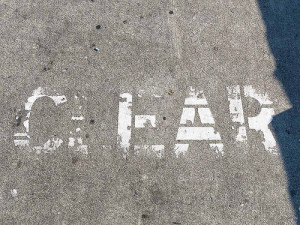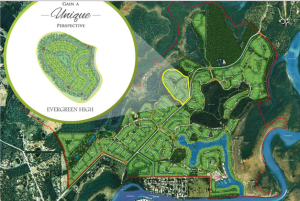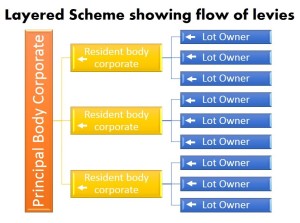 Searching a lot in a Resident Body Corporate (RBC) that is part of a body corporate layered scheme is always a frustrating experience for me because it only tells half of the story. The other half is what’s happening in the Principal Body Corporate (PBC).
Searching a lot in a Resident Body Corporate (RBC) that is part of a body corporate layered scheme is always a frustrating experience for me because it only tells half of the story. The other half is what’s happening in the Principal Body Corporate (PBC).
What happens in the PBC contains the probability of impacting severely on the RBC and from there the lot owners.
This article discusses the interaction between PBC and RBC’s and the way that cost sharing arrangements can impact on lot owners.
Body Corporate Layered Schemes & Their Costs
To facilitate this discussion it’s useful to actually see a layered body corporate. So here is a picture of Coomera Waters.
 Coomera Waters is a large layered scheme on the Gold Coast. You cannot tell from the picture but they are a mix of house blocks, apartments and retail area. It’s a master planned community that consists of three Principal Body Corporates, contained within the red outline, and to date I believe 15 Residential Body Corporates.
Coomera Waters is a large layered scheme on the Gold Coast. You cannot tell from the picture but they are a mix of house blocks, apartments and retail area. It’s a master planned community that consists of three Principal Body Corporates, contained within the red outline, and to date I believe 15 Residential Body Corporates.
Evergreen High, displayed here is the newest land sale and will most likely be a new RBC, and for the purposes of this discussion we’re going to assume it is.
Defining PBC costs
Looking at the overall plan we can see there are roads all through the community, some park areas and a marina. There will also be a lot of infrastructure that you can’t see like water mains, electrical lines, sewerage conduits and so on.
If we focus on just Evergreen High we can see that there’s also roads and parks within the body corporate plus some green space around the edges.
The question is: Who pays for what?
Looking at our example, anything contained within Evergreen High is the responsibility of Evergreen High and its lot owners. That includes the roads, parks, green space, and all the infrastructure. The body corporate must rectify issues at its own cost.
By contrast everything outside Evergreen High is either PBC responsibility or another RBC. So the main roads linking to council roads, the infrastructure to Evergreen High, the marina and all the parks and green spaces are PBC responsibility.
It’s exactly the same as the distinction between what is lot owner responsibility and what is body corporate, except in this case its between the RBC and the PBC.
Financing the PBC
 Just like any body corporate the PBC is financed by levies paid by its lot owners. The only difference in this case is the lot owners of the PBC are body corporate’s themselves.
Just like any body corporate the PBC is financed by levies paid by its lot owners. The only difference in this case is the lot owners of the PBC are body corporate’s themselves.
Back to our example of Evergreen High, the lot owners of that body corporate only pay one levy to Body Corporate Evergreen High. In calculating that levy however the body corporate would include estimates for levies payable to the PBC.
Just like any other body corporate the PBC is financed completely by it’s lot owners, which happen to be RBC’s, who themselves are financed by their respective lot owners.
Therefore any added cost to the PBC will have a trickle-down effect of higher levies to the RBC’s and from there to individual lot owners.
Disputes and PBC’s
A cost that is split between 50 people is going to be a lot less than a cost that is split between 5 people.
Consequently it’s beneficial for all RBC’s, and their lot owners, to have a cost declared a PBC cost, since now the other members of the layered scheme must help fund the PBC financial requirements.
Or conversely if the declared PBC cost is not associated with your RBC it can seem unfair to have to pay for something which has little benefit for you and your fellow owners.
What is or isn’t PBC cost is often hotly contested.
A lot of the decision will come the setup of the layered scheme. The example above, Coomera Waters, is a master planned community and is actually fairly simple and clear cut in terms of who pays what.
Other schemes are not so clear.
For instance, the case of Sun Building, a PBC containing the RBC lots Body Corporate Sun Retail and Body Corporate Sun Apartments. The building had water ingress issues which eventually required the roof membrane be replaced.
A motion was passed at EGM by the PBC to proceed with works.
Body Corporate Sun Retail, made up of the shops at the bottom of the building, objected to having to pay 39% of roof rectification works since the roof was not actually contained within their RBC. After considering the facts the Adjudicator agreed.
On the surface it might seem all lots in a body corporate should pay for roof works, notwithstanding they’re not the lots effected, however, things in layered schemes are not always so clear.
Pre-Purchase Inspection Reports and Body Corporate Layered Scheme
Which brings me back to the difficulties I experience searching lots in RBC’s. RBC’s and PBC’s are different body corporates, and access to the records of one does not immediately grant you access to the records of another.
Searching only the RBC then is only obtaining half of the story; what is happening within the RBC itself.
The PBC has a much wider focus which includes many different body corporates and potentially other lots such as shopping centres or hotels. If it is embroiled in major dramas, particularly dramas that involve injections of funds, it will eventually trickle down to the RBC and from there to the lots and the lot owner / purchaser.
So does that mean you should get two searches? One for the PBC and one for the lot in the body corporate into which you’re buying?
Purchasers object to paying for one strata search let alone two, so I can’t believe I’m saying this, but yes. If you’re being thorough. Check out what’s happening in the PBC.
Strata searching is about using knowledge to gain power to make decisions. It’s hard to do with any certainty with only half the story.
photo credit: Frederic Poirot via photopin cc
 Unless stated otherwise all the information on this website relates to Queensland legislation.
Unless stated otherwise all the information on this website relates to Queensland legislation.
Is there any way to total get rid of body corporate in your housing estate as they do nothing in our area they don’t even maintain the parks etc that is done by Gold Coast city council it is a disgraces
Hi Sharron
Body corporates can be sold and wound up…or extinguished it’s called. Someone would need to buy all the lots. That way they get the common property as well.
Otherwise no, it’s part of the subdivision that created the lots.
Does the Chair of the PBC have any influence over an RBC Common area.
Or do they just preside over PBC Common Areas.
Hi Roy
Correct, the PBC committee reside over the PBC common areas.
The PBC Chair making decisions about the RBC common area would be like your committee coming into your home and rearranging your furniture. Its none of their business. The RBC is a lot to the PBC, hence private property. The RBC does need to observe PBC by-laws.
Hi, great summary.
In our layered scheme we refer to SBC, subsidiary body corporate, not RBC as you have done.
Is there a technical difference ? Only 3 of our 4 SBCs are wholly residential.
In our scheme there is a service agreements (for sewerage services) between the PBC and 3 of the SBCs . Ive noticed that the agreement is not listed in our SBCs register or on the stratamax owner portal. That implies to me that even on a good search the existence of that agreement might not be clear. What is best practice disclosure here?
thanks
Hi Therese
Subsidiary body corporate is more technically correct than resident body corporate because, as you noted, not all subsidiaries are residential. In context of this article they mean the same thing.
Re the sewerage agreement – I’m a bit unsure who’s providing the service here. Is your scheme providing the service to the PBC and SBC’s? If they are providing the service I would not expect them on the contract register as your SBC is the provider. The agreement though should be in the records. There is often more data made available when a search of records is completed than is typically available on an owner portal, though I make that comment based on reports from others not familiarity with the owners portal myself.
Is the PBC providing the service to the SBC’s including yours? If they are, then I suggest the omission from the register is an error that should be bought to body corporate manager’s notice, or whomever keeps the register / portal.